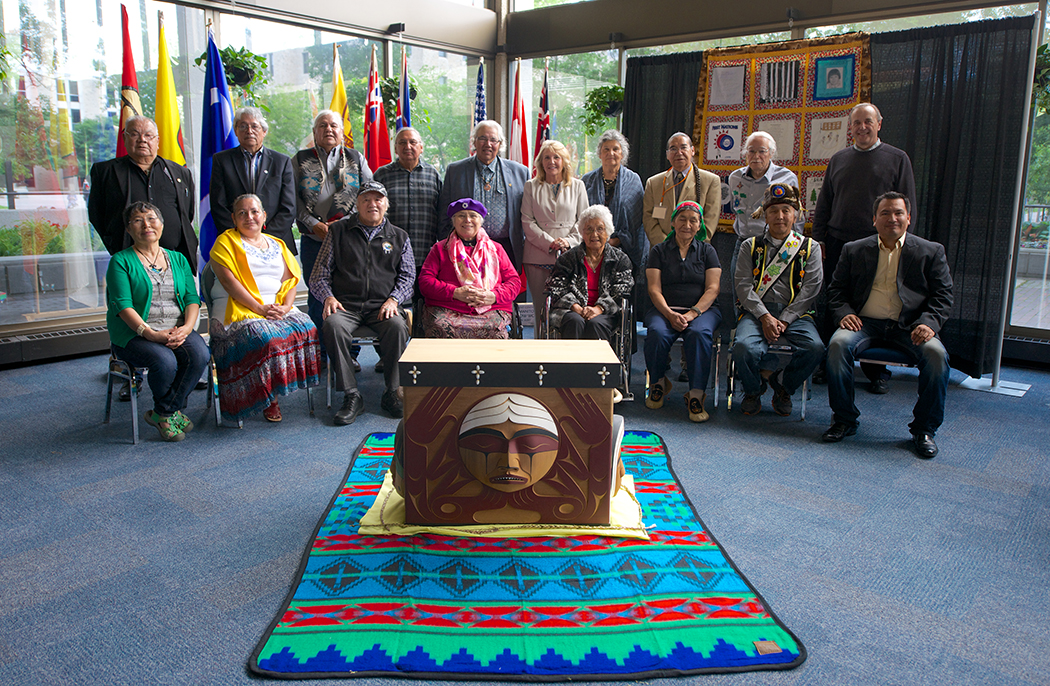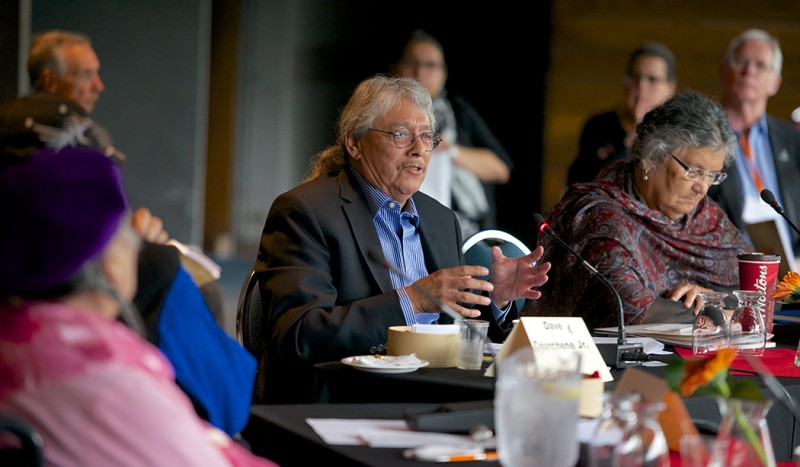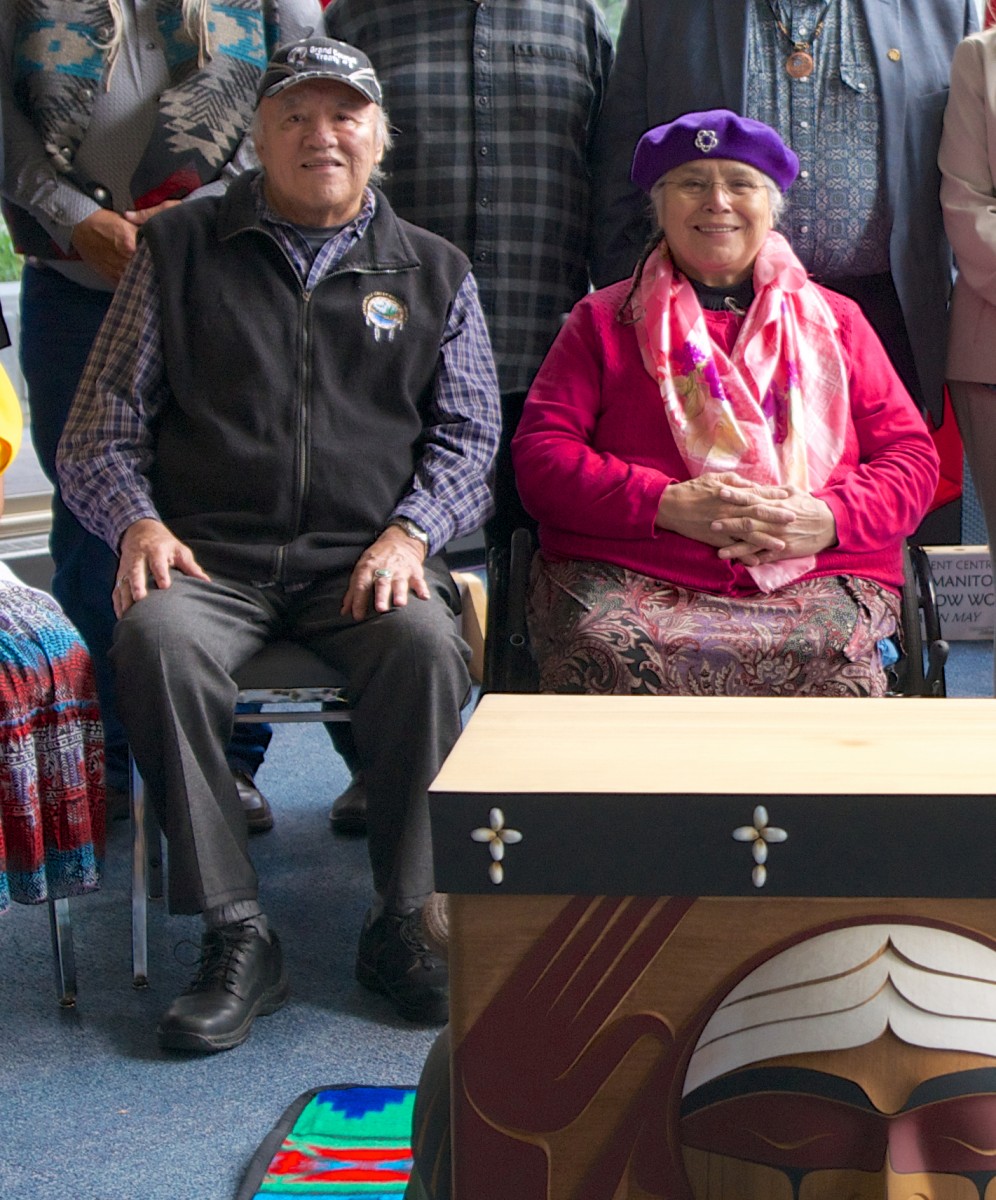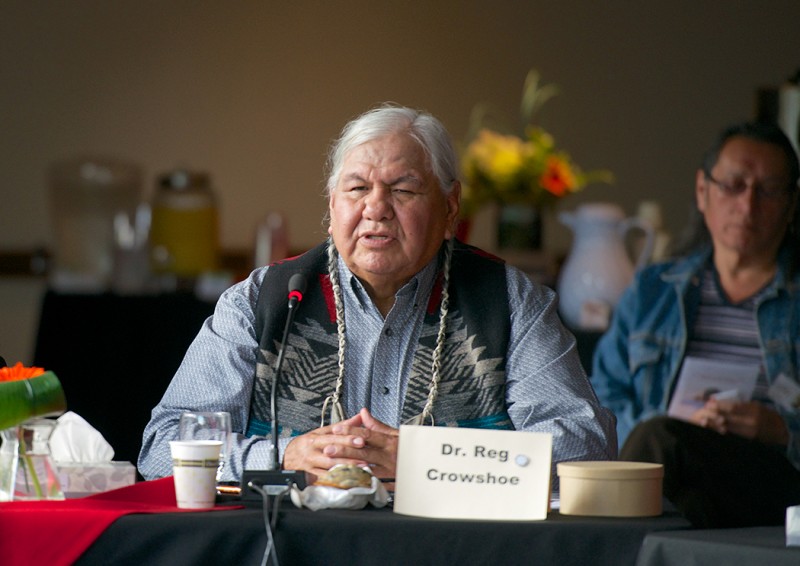
The TRC commissioners, elders and traditional knowledge keepers at the closing of the final forum on June 25.
Whose truth, how reconciliation?
Anishinaabe Elder and Turtle Lodge founder Dave Courchene remembers when the Truth and Reconciliation Commission of Canada (TRC) initiative was first made public. “Whose truth?” he pondered.
The response to the TRC — intended to address the direct effects and ongoing legacy of the 100-year Indian Residential School system — was similar for many First Nations, Metis and Inuit.
They needed to understand how this commission — its language and definitions, its processes — could be approached from their own individual and collective experiences and in terms of their own cultures, practices and languages. They struggled with how to make the process their own.
Since it was initiated in 2008, the TRC has collected more than 6,200 statements — and statements will continue to be collected. It has done the work of statement gathering as a way to address the direct effects and ongoing legacy of the Residential School system.
Led by its chair, the Honourable Justice Murray Sinclair, and two commissioners, the TRC has also hosted dozens events across Canada, including seven national events in different regions across Canada to promote awareness and public education about the IRS system and its impacts. The TRC’s mandate, which is “to guide and inspire the process of reconciliation in both Aboriginal and non-Aboriginal people,” will officially end in the establishment of a house the national research centre (NRC), to be housed at the University of Manitoba.
The TRC’s final event, a two-day Traditional Knowledge Keepers Forum, took place on June 25 and 26 at the University of Manitoba. The forum participants, 15 Aboriginal elders and spiritual leaders from across the country, told stories and commented on their understanding of forgiveness and reconciliation. One of them was Elder Dave Courchene.
***
Courchene said that “truth, understood in our language … is the spirit of grandmother turtle,” which, in Indigenous teachings, was chosen by Creator to hold the remembrance of all the teachings, including humans’ relationship to Mother Earth and the Spirit [additional information from The Journey of the Spirit of the Red Man: A Message from the Elders, co-written by Courchene].
How is reconciliation possible, what does it mean, for “those who felt the brutality [of Residential Schools and the colonial system] and shared their own experience?” he asked. “Today we still see the impacts on our community.”
The answer, he suggested, may lie in reconciliation, but in reconciliation “first with Creator … and then with our ancestors.
“We must go back to the beginning, recognizing the Spirit within each of us and within everything. We cannot intellectualize Spirit; allow yourself to live from the heart. You cannot have truth without respect, you cannot have truth without love, you cannot have truth without courage, you cannot have truth without honesty, you cannot have truth without wisdom, you cannot have truth without humbleness,” he said.
“The mind is concerned with power, control, ownership … but we owe our existence to the land itself. I cannot be convinced that those in power have a vision … vision comes from the Highest. Real intelligence lies within the Spirit world, in the footprints of our ancestors. Each individual has to reach out — that will result in a collective vision.
“We [Indigenous peoples] have stayed here… We still have memory of the land, a memory, duty and sacred responsibility to our people.”
One of the greatest challenges, he said, would be “to teach the people who have imposed [their values] on us who we are.
“The commission has an opportunity to be a strong voice for us as a people.”
Courchene: “The commission has an opportunity to be a strong voice for us as a people.”
***
The commission had asked all participants to provide, on behalf of their own peoples and territories, their understanding of reconciliation and the traditional teachings on reconciliation and forgiveness, and to comment on what they would like the commissioners to say in their final report about reconciliation and healing.
The focus was on three questions:
What is your understanding of reconciliation? — keeping in mind your traditional teachings as you know them, and in practical terms, considering how people might live in a state of reconciliation.
Second, what is needed to achieve reconciliation? — including such considerations as a potential timeline for reconciliation.
And finally, how will we know that reconciliation has been achieved?
Opening the proceedings, Justice Murray also suggested that the speakers consider the following, in the light of the final report to be prepared by the commissioner as a result of the proceedings: What is the nature of forgiveness in the context of reconciliation? Is forgiveness necessary? What messages and recommendations would you like the commissioners to express in their final report?
***
Ceremonial learning, reconciling
Walter Linklater is Ojibwe/Anishinabe and a Residential Schools survivor who also serves as an Elder at the University of Saskatchewan. He added to the teachings already shared about reconciliation.
“The way to solve problems is to listen to the spiritual teachings of the elders,” he said. “The [final TRC] report has to incorporate some of those teachings.”
Linklater recounted his own story, which started with seven years immersed in his own culture, values and language, then 11 years in Residential School, where he learned very different values.
The result? “I didn’t know who I was,” he said.
16 years of active alcoholism followed, during which time he was also teaching at a college in Thunderbay. It was in the 1970s that the spiritual renewal occurring amongst Indigenous people brought Linklater back to traditional teachings. He began meeting with an elder, who told him, about his identity confusion and pain as a result of his time in Residential School, “First of all, you are not a Catholic.”
“What am I, then?” he asked.
“What am I, then?” Linklater asked.
Linklater says that he started to reclaim his Anishinabe identity through ceremonial learning.
When he returned to see the Elder he called “the Old Man,” the Old Man told him, “I sense some resentment in you. Didn’t you go to Residential School? Have you forgiven them yet?”
“No,” responded Linklater. “I’ll never forgive those bastards.”
“You’ll never be able to live in peace with yourself and your family until you forgive them,” said the Old Man.
“Why don’t you go back to the Schools [where you went to Residential School], and the graveyards, put some tobacco down and ask for forgiveness?
Linklater went. “Now I have more understanding. I began to learn to live in harmony with myself, Mother Earth, the animals. I learned over the years to reconcile myself … to live in harmony with all.”
The act gave him the start of “a deep understanding of what the elders are trying to tell us,” he said.
“There’s a lot of goodness and power that exists in our ceremonies. Because there is so much evil out there, we have to learn not to hurt what Creator has given to us. We come from there, Manitou.”
Appealing to the circle of participants, Linklater advocated for “our spiritual development, being careful who you counsel. If we know where we come from inherently, we have all the spiritual principles we need from ceremonies. Always try to be aware of the Spirit [Mantiou] that’s there. We get power from those spirits, from those ceremonies.”
The final report, he said, has to include spiritual principles and teachings, so that “it will have a better impact on changing us.
“Thank Him for the experience of the Residential Schools. Ask for him to help us understand how we can reconcile, for when we die, [for] our spirits we came into the world with,” he continued.
Some of the teachings, he added, are very similar. “It’s how I was able to reconcile myself.
“We will always keep learning. Be kind, be nice, help the old people, help the young people.”
Honouring
Maria Linklater also spoke about the importance of spiritual teachings. “Look outside,” she said. “Honour the sky, the creator. The world is so beautiful. If I continue to teach my children, my words will live on. For women, honour your womanhood. Respect your womanhood. Women can be strong. Pray hard and be spiritual.”
The spiritual perspective is one to be cultivated, she suggested. Explaining the transformative possibilities, she drew on the example of the fear resulting from being told about “hellfire”; she said, “Fire can destroy, but it also gives us power.”
On being told about a “devil tree” by local children, she followed them to the tree and saw that it had a large branch jutting out from the trunk at a severe angle.
She told the children the tree is beautiful. “Our world is beautiful. If I hear about something [bad], I will turn it the other way, make it beautiful.”
***
Trauma and an ethical space for recovering practices
Dr. Reg Crowshoe is Peigan/Blackfoot from the Piikani Nation, and is also its former Chief and a Ceremonial Grandparent. He noted that each geographic territory and nation has its stories and laws.
“Out of [our] belief system, we got our practices — that allow you to survive.” The songs also come out of practices, he explained.
The Residential School period, during which Indigenous peoples were taken away from that Circle and moved into Western practice — classrooms, bells, etc. — resulted in trauma and cognitive dissonance, he said.
“We were punished for every step we took,” Crowshoe said, referring to early reprimands for running in the classroom and commands to “proclaim Christ.”
The children were told that “God can see in my mind,” he said — which added to their fear, shame and cultural confusion.
Crowshoe: “We were punished for every step we took.”
“We need to understand some of our past,” he said, as it was before Western protocols — theories, libraries, fees. “We have an oral culture — how do we access our theories, stories, songs, practice?”
Emphasizing the importance of respecting other nations’ “authorities, their songs and ceremonies” when entering their territories, he told the other participants “we need to move away from” divisive conflicts.
There is a need for an “ethical space,” he suggested, one with “respect, honour, truth, where we hear each other’s stories…. One that allows us the right to start looking for best practices. We need to work together because our young people need that, our collective working together.”
Opposing this approach to an “anthropological” one — “being studied,” with someone else giving their findings, even given the incorrect information, Crowshoe asked, “What are our authorities? How do we say ‘forgiveness’?
“There were two different cultures that clashed,” he summarized, referring to colonialist practices.
“That conflict hurt. We need to go back and find our stories and theories.”
***
Read Part 1 here.
Check back for Part 3 of our special feature on the TRC’s Traditional Knowledge Keepers Forum.
Error thrown
Object of class WP_Error could not be converted to string









